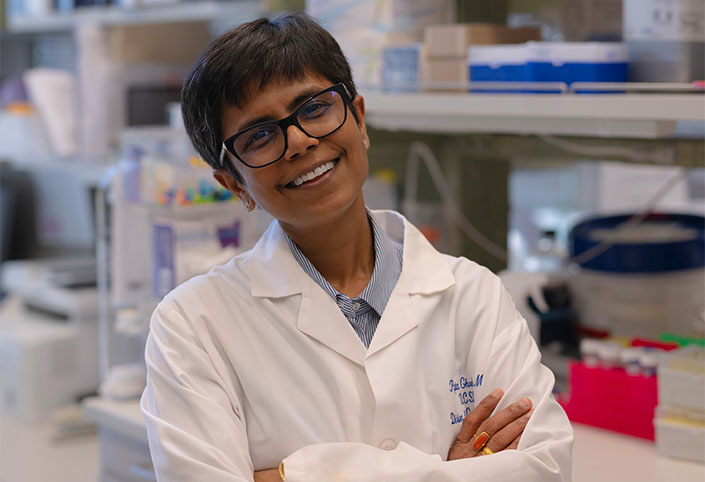Measuring the Intelligence of a Cell
A new center of excellence at the University of California San Diego integrates research, industry and technology to enhance quantitative biology
Published Date
Story by:
Media contact:
Topics covered:
Share This:
Article Content
The Oxford English Dictionary defines synergy as “dynamic, productive, or profitable affinity, association, or link.” That perfectly describes the new Agilent Center of Excellence for Cellular Intelligence at the University of California San Diego, where scientists can further their investigations of cellular dynamics through cooperative use of advanced technology.
The Agilent Center of Excellence (CoE) grew out of a partnership between the University and Agilent Technologies. Originally a spin-off of Hewlett-Packard, Agilent is now a global company specializing in solving thorny problems in biopharmaceuticals, cell analysis and cancer diagnostics through testing and measurement.
The Agilent CoE for Cellular Intelligence, which was unveiled April 2, led by Pradipta Ghosh, M.D., professor in cellular and molecular medicine and founding director of the School of Medicine’s Institute for Network Medicine. Ghosh’s research aims to uncover the fundamental organizing principles of living systems through quantitative biology (see sidebar). The Agilent CoE will be the ideal venue for pursuing her vision—specifically, what Ghosh calls “cellular intelligence,” or how a cell learns to adapt to its environment.

In addition to spearheading the new Agilent Center, Pradipta Ghosh is founding director of the Institute for Network Medicine at UC San Diego School of Medicine. Photo by Erik Jepsen/UC San Diego
The Agilent CoE will occupy 650 square feet in the George Palade Laboratories for Cellular and Molecular Medicine. Researchers across campus will have access to nearly $3.5 million of Agilent equipment and scholarships for training the next generation of scientists. Among the capabilities that this partnership brings is a robotic liquid handling system to assess metabolomics, proteomics and lipidomics; an analyzer to detect discrete changes in a cell’s energy production, use and storage; and live cell imaging modalities that allow measuring in real time the changes in a cell’s life cycle, health and processes, all technology that doesn’t currently exist on campus in a widely available format.
Use of the equipment will be overseen by a newly appointed operations director, a postdoctoral fellow chosen by Ghosh from the Institute for Network Medicine. The position will come with the named title Agilent Postdoctoral Fellow, acknowledging Agilent support for part of the position. Agilent will train the fellow to use the equipment and assist other researchers in its use.
Sometimes, centers of excellence can be solely showcases for a company’s equipment with little engagement beyond the materials. The Agilent CoE for Cellular Intelligence is an entirely different animal, with a focus on growing research partnerships and producing highly qualified talent. Agilent will sponsor grants for funded research in cell analysis, by invitation only to researchers across campus, and hold events for students, researchers and local startups.
Agilent is also planning on collaborating directly with Ghosh’s lab. According to Jim Lynch, business development director at Agilent, “We’re looking at specific science projects where Dr. Ghosh will be given access to Agilent research and development (R&D) people working on next-generation applications.”
The partnership between the University and Agilent also has the potential to broaden the University’s global reach. Says Ghosh, “While negotiating this partnership, I made a presentation to Agilent’s global team leads, who joined from every part of the world. We had a stimulating discussion about everything that's going on at the Institute for Network Medicine, and they were very pleased to see the depth and breadth of what can be developed collaboratively. Later they discussed their top priorities in cell analysis and how to find ways to engage with us more.”
This fits into the University’s Innovation priorities to engage with corporate partners and create new collaborations that augment the research and development capabilities of each organization. For instance, in association with Thermo-Fisher, UC San Diego is opening the Goeddel Family Technology Sandbox later this year, which will enhance access to cutting-edge technology that will accelerate collaboration, technology transfer and workforce development. The Collaborative Research Framework partnership will create a collaborative research framework to push the new frontiers of science, from cryo-EM to CRISPR to data science.
“We have a deep engagement with Agilent beyond the state-of-the art equipment they are loaning to the Agilent CoE for Cellular Intelligence—they’re a terrific partner for the long term,” says Anne O’Donnell, senior executive director for corporate strategy and engagement at the UC San Diego Office of Research and Innovation. “The funding for student support, invitation only sponsored research, and lecture series all add to the Agilent CoE being far more than just a showcase for equipment.”
Topics covered:
Share This:
You May Also Like
Stay in the Know
Keep up with all the latest from UC San Diego. Subscribe to the newsletter today.




